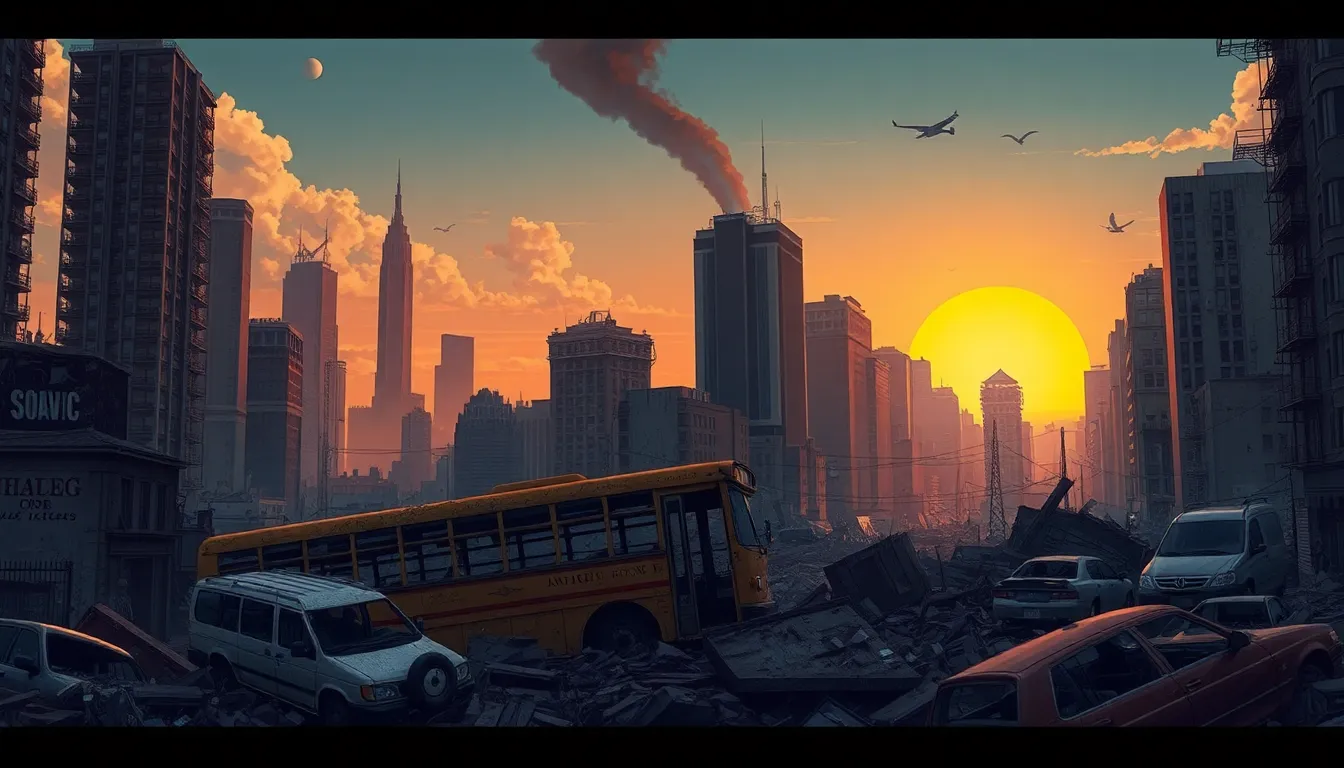Table of Contents
ToggleIn a world where nuclear war reshapes the landscape and humanity’s fate hangs by a thread, the Fallout series offers a haunting glimpse into a post-apocalyptic future. But when exactly did the bombs drop? This question isn’t just for lore enthusiasts; it’s a key piece of the puzzle that defines the series’ rich narrative and the struggles of its unforgettable characters.
Picture it: the year is 2077, and the world’s on the brink of chaos. As tensions rise and diplomacy crumbles, the clock ticks down to a cataclysmic event that changes everything. Buckle up as we dive into the timeline of devastation, exploring the moments that led to the iconic fallout and the quirky charm that keeps fans coming back for more. Get ready to uncover the history behind the explosions and what they mean for the wasteland dwellers we’ve come to love.
Overview of Fallout Series
The Fallout series unfolds in a post-apocalyptic setting, stemming from a nuclear war that occurred in 2077. This defining moment marks the collapse of civilization, drastically altering the landscape of humanity. Players explore various regions, each showcasing the remnants of pre-war society, alongside mutated creatures and surviving factions.
Several games emphasize unique storylines, engaging players in quests that confront moral dilemmas and survival challenges. The franchise began with Fallout in 1997, introducing a turn-based role-playing system. Successive titles built on this foundation, evolving into real-time combat mechanics while preserving the core elements of exploration and character development.
Characters within the series often navigate the consequences of the Great War, revealing the impacts of humanity’s choices. Dialogue choices significantly affect interactions, shaping relationships and altering timelines. Gamers encounter iconic places, such as the Capital Wasteland and the Commonwealth, enriched by environmental storytelling and lore.
Additionally, themes of technology, isolation, and the human condition resonate throughout the narrative. Each installment provides an immersive experience as players embody characters like the Vault Dweller and the Sole Survivor. The series maintains a dedicated fanbase, thanks to its intricate world-building, humor, and dynamic storytelling.
As the timeline progresses, understanding the origins and implications of the nuclear devastation remains crucial. Each game’s setting builds upon the last, revealing the long-term effects of the bombs. Through exploration and engagement with diverse quests, players piece together the fragmented history of a world forever changed.
The Bombing Timeline

The timeline of the nuclear war in the Fallout series reveals key events that led to the devastating bombs dropping in 2077. Understanding this timeline provides context for the series’ narrative and impacts players’ experiences.
The Prelude to the Bombs
Tensions escalated gradually in the mid-21st century. Nations competed for dwindling resources, especially oil and clean water, which heightened rivalries. The United States and China became particularly embroiled in conflicts over these resources. Events such as the Sino-American War contributed to the atmosphere of distrust. Political divisions festered, leading to military build-ups and preparations for conflict. This escalating tension set the stage for the catastrophic events that unfolded on October 23, 2077.
Significant Dates and Events
October 23, 2077, marks the day the bombs fell. In the afternoon, a series of nuclear strikes commenced, initiated by various nations, primarily the United States and China. This devastating event resulted in widespread destruction and loss of life. Minutes before the first strike, civil unrest and panic spread among the global population. Communication failures compounded the chaos, leaving many unprepared for the fallout. Important locations such as major cities were obliterated within moments. The impacts of these strikes significantly reshaped human civilization and spawned the post-apocalyptic landscape depicted in the Fallout games.
Impacts of the Bomb Drops
The bombs dropped in Fallout had immediate and lasting impacts on the world. Understanding these effects provides insight into the setting of the games.
Immediate Effects on the World
The initial explosions caused widespread destruction of cities and infrastructure. Millions of lives were lost instantly as nuclear fallout swept across regions. Survivors faced immediate dangers, including radiation exposure and hostile environments. Panic and chaos erupted as communication systems failed, isolating communities. Within moments, the familiar landscape transformed into a barren wasteland filled with ruins. The aftermath of the bomb drops left critical resources scarce, intensifying the struggle for survival among the few remaining humans.
Long-Term Consequences
Decades after the bombs dropped, the world remained altered in profound ways. Nuclear radiation caused mutations in flora and fauna, leading to bizarre and aggressive creatures. Societies fragmented, and factions emerged in the struggle for power and resources. Some groups turned to pre-war technology, while others embraced a more tribal lifestyle. Environmental degradation reshaped landforms and ecosystems, creating unique challenges for survivors. The psychological impact of the Great War echoed in the minds of the remaining population, manifesting in distrust and conflict among factions.
Thematic Significance in Fallout
Fallout’s narrative deeply engages players with the ramifications of the bombs dropping in 2077. Many key themes emerge from this catastrophic event, shaping the lives of characters and the environments they inhabit. One prominent theme is the exploration of technology. The series showcases both the potential and dangers of advanced technologies, which led to the Great War’s devastating outcome.
Isolation also plays a crucial role in the post-apocalyptic world. Survivors navigate through desolate landscapes, grappling with the loss of familiarity and community. Characters often find themselves alone or in small factions, fostering a sense of distrust among them. Relationships frequently pivot around rebuilding these connections against a backdrop of devastation.
Human condition questions permeate the Fallout series. Players witness how desperation shapes survival strategies, revealing darker aspects of humanity. Choices made throughout the games challenge players to reflect on moral dilemmas, particularly when dealing with scarce resources and conflicting ideologies.
Environmental storytelling enriches the gameplay, with each region reflecting the devastating history of the bombs. Locations tell stories of loss, resilience, and adaptation, depicting remnants of a once-thriving society. The Capital Wasteland and the Commonwealth stand as testaments to what has been lost, prompting players to consider historical echoes in their adventures.
Examining the consequences of the Great War highlights themes of rebirth and transformation. Mutations and new ecosystems illustrate nature’s resilience, with bizarre creatures populating these altered landscapes. Fallout ultimately presents a complex tapestry of survival, adaptation, and the ever-relevant question of humanity’s place in a world taken from them.
The impact of the bombs dropping in 2077 resonates throughout the Fallout series. This pivotal moment not only reshaped the world but also set the stage for countless stories of survival and resilience. Players continue to explore the remnants of a civilization that once thrived, uncovering the deep lore and rich narratives that define the franchise.
As they navigate the post-apocalyptic landscape, themes of technology, isolation, and human nature come to life. Understanding the events leading up to the Great War enhances the gaming experience, allowing fans to appreciate the intricate details woven into the Fallout universe. The legacy of the bombs serves as a reminder of the fragility of civilization and the enduring spirit of those who remain.





